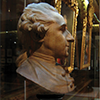Layered Liberalism: the Golitsyn Legation in the Dutch Republic (1770-1782)
DOI:
https://doi.org/10.18352/bmgn-lchr.10403Keywords:
liberalism - Russia - Dutch Republic - diplomatic history - political history - East-West relationsAbstract
This article discusses how Prince Dmitrii Golitsyn’s diplomatic mission in the Dutch Republic (1770-1782) led him to develop liberal views on different levels: in his intellectual work and correspondence, in his diplomatic service, and in his scientific and academic views. The article starts out from the contrasting contexts he found himself in: his position as a thoroughly Europeanised (and partially Europeanraised) diplomat working to defend the interests of the Russian Empire. Next, the article then examines how constrained Golitsyn actually was by state service, and how the Dutch environment he lived and worked in gradually liberated him from these restrictions. Yet did this contrast of contexts truly liberate him, or compel him to shift his focus from diplomacy to science over the years? In the article, I explore the different domains in which Golitsyn worked by looking at two cases in which Golitsyn made his mark and which resonated in European politics and science: his Dutch-oriented take on negotiating the League of Armed Neutrality and his later scientific work and defense of the physiocrats. In both cases, it appeared that Golitsyn’s diplomatic service in The Hague and his position in Dutch society, where he chose to remain even after he had left Russian service, time and again turned out to be decisive factors for the development of his ideas and actions.
Dit artikel onderzoekt hoe prins Dmitrii Golitsyn tijdens zijn diplomatieke missie in de Nederlandse Republiek (1770-1782) liberale standpunten ontwikkelde in zijn intellectuele activiteiten en correspondentie, zijn diplomatieke praktijk, zijn wetenschappelijk en academisch werk. Een belangrijk vertrekpunt van dit artikel is het grote contrast tussen de verschillende contexten waarin Golitsyn moest werken. Enerzijds was hij een sterk verwesterde diplomaat, deels opgegroeid in West-Europa. Anderzijds moest hij zonder uitzondering de belangen van het Russische keizerrijk verdedigen, ook in de Nederlandse Republiek. Het artikel onderzoekt in welke mate dit officieel kader Golitsyn begrensde en hoe hij zich tijdens zijn verblijf in Den Haag geleidelijk aan losmaakte van het officiële keurslijf,waarna hij zich uitsluitend nog op de wetenschap toelegde. De verschillende domeinen waarin Golitsyn actief was, worden verkend aan de hand van twee casestudy’s die weerklank vonden in de Europese politiek en wetenschap: zijn pro-Nederlandse houding bij het onderhandelen van het Verbond van Gewapende Neutraliteit (1780-1783), en zijn latere wetenschappelijk werk en apologie van de fysiocraten. In beide gevallen bleken zijn diplomatieke werk in Den Haag en zijn positie in de Nederlandse maatschappij, waar hij bleef wonen nadat hij de diplomatieke dienst had verlaten, een bepalende factor in de ontwikkeling van zijn standpunten. Het veelzijdige liberalisme van Golitsyn, dat zich manifesteerde op politiek, wetenschappelijk en cultureel niveau, toont tot slot aan hoe belangrijk de bijdrage van buitenlandse diplomaten aan de Nederlandse politiek en maatschappij kon zijn, zeker tijdens de turbulente jaren tachtig van de achttiende eeuw.
Downloads

Published
Issue
Section
License
Authors who publish with this journal agree to the following terms:
a) Authors retain copyright and grant the journal right of first publication with the work simultaneously licensed under a Creative Commons Attribution 4.0 International (CC BY 4.0) that allows others to share the work with an acknowledgement of the work's authorship and initial publication in this journal.
b) Authors are able to enter into separate, additional contractual arrangements for the non-exclusive distribution of the journal's published version of the work (e.g., post it to an institutional repository or publish it in a book), with an acknowledgement of its initial publication in this journal.
c) Authors are permitted to post their work online (e.g., in institutional repositories or on their website) prior to and during the submission process.
Authors are explicitly encouraged to deposit their published article in their institutional repository.








